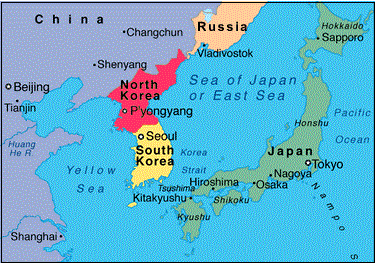Last Tuesday marked the 72nd anniversary of the end of the Pacific. That same day, August 15, 1945, has been celebrated ever since by both South Korea and North Korea as Liberation Day. The two Koreas, however, have long been divided. Can they ever be united again?
The Liberation of Korea
The Korean Peninsula was basically under Japanese rule from 1905 until the end of the Pacific War. The Russo-Japanese War (1904–05) was fought between the Russian Empire and the Empire of Japan over rival imperial ambitions in Manchuria and Korea. One spinoff of Japan’s victory in that war was the Japan–Korea Treaty of 1905, which made Korea a protectorate of Imperial Japan.
Then with the Japan–Korea Treaty of 1910, Japan formally annexed Korea and the latter was completely under Japan’s control until August 1945. With Japan’s defeat, Korea was finally freed from Japanese rule.
It is not surprising that August 15 is celebrated as Liberation Day in what soon became two Koreas.
The Division of Korea
Provisional military governments were set up in Korea after the peninsula’s liberation from Japan. Korea north of the 38th parallel fell under Russian control, the U.S. had command of Korea south of that line of demarcation.
Since no agreement could be reached on establishing a unified government, two nations emerged. After the May 1948 elections in the south, on August 15 the Republic of Korea formally took over power from the U.S. military, with Syngman Rhee as the first president.
In September 1948, the Democratic People's Republic of Korea was established in the north. Kim Il-sung, the grandfather of the current “supreme leader” of North Korea, became premier.
The Reunification of Korea?
Kim Il-sung began the Korean War in 1950 in an attempt to reunify the entire peninsula—and we know how that turned out. An armistice was signed in July 1953 but no peace treaty was ever signed—so the two Koreas are technically still at war.
Among Koreans, perhaps especially among Korean Christians, there has long been a dream for the reunification of the two countries. This past Sunday (Aug. 13) the World Council of Churches was joined by the World Evangelical Alliance in a “Sunday of Prayer for the Peaceful Reunification of the Korean Peninsula.”
Fervent prayers for reunification were very prevalent twenty years ago. I remember being in Korea in 1997, at a time when there were strong prayers for, and the hope of, reunification in the “Jubilee Year,” the fiftieth year after the division of 1948.
Sadly, such unification seems less likely now than it did twenty years ago.
Kim Jong-un would doubtlessly agree to unification if he were allowed to be the head of the unified country. But there is no way South Korea would accept Kim’s remaining in power over all of Korea.
Similarly, there is no way Kim would give up power in order for there to be a unified Korea.
So, no, it doesn’t seem that the unification of Korea is possible short of a regime change in North Korea—but more than anything else the fear of such an attempt is fueling Kim’s frantic attempt to develop nuclear weapons.
Kim’s fear of being attacked is likely far greater than most fears in this country of being attacked by North Korea.
The U.S. strategy toward North Korea should focus on containment, on negotiation, as well on financial and technical aid for producing more food and services for the North Korean people—anything but “fire and fury.”


Thanks, Leroy. Nice piece on Korea. I'm not sure our president knows anything but "fire and fury" when dealing with challengers to him.
ReplyDeleteI much appreciate Thinking Friend Eric Dollard sending the following comments:
ReplyDelete"Thanks, Leroy, for your comments about Korea.
"The reunification of Korea may happen someday in the distant future, but currently China and many South Koreans oppose it. China fears a unified Korea allied with the U S; it also fears the hordes of refugees that could pour into China if the regime in Pyongyang collapsed. South Koreans fear the cost of rebuilding a seriously underdeveloped North Korea.
"I suspect that at some point a reformer will come to power or there will be a military coup. Once this happens, the prospects for reunification will be much brighter.
"We have close friends from South Korea. Another Korean war would be devastating and they would very likely lose many or even all of their loved ones in South Korea, so I fervently hope a war can be avoided. Diplomacy, as you have said, is much better."
Leroy, thanks for a good blog. all you have stated is fair and correct. i think, reunification is coming mysteriously. i trust in the newly elected President Moon. i think he is a kind of leader who would work toward reunification. i do hope.
ReplyDeleteThanks, Ed! I much appreciate you taking time to read and comment on this article, for you are (I think) the only one of my Thinking Friends who was born in Korea when it was still under Japanese control.
DeleteI also hope that there will be reunification, and I have a good impression of President Moon. But I still don't see how reunification could possibly happen soon--without military action, which we do not want to see.
Political unity seems to depend on a fairly large number of not always predictable or desired factors. Geographical proximity, a common language, a common ethnicity, shared historical experiences, much common culture and to a certain extent shared religious views, would all seem to call for, even predict a common political structure and unity. But your history—centuries of being occupied and controlled by “foreign” interests, wars, colonialism, revolutions, creating political boundaries by outside parties—indicate why it is no easy matter to bring these two parts of the island together. I often puzzle at the
ReplyDeletesituation of the Dominican Republic and Haiti, and experience sadness with the story of north and south Ireland, to name a couple of others. Maybe we should reflect on the southwest part of the “United States” and Mexico as well, as the same time this month as we are articulating political views in the U.S, historically connected with “north” and “south”. A long way of saying no easy answer ahead for North and South Korea, despite our wishes for what would seem so “natural”.
Thanks for your comments, Larry--and for pointing out the difficulty of unifying countries/regions that, theoretically, should be one instead of two.
DeleteOf course there is one good example of peaceful reunification--of East Germany and West Germany.
Thinking Friend Jo Beth Fielder, a former missionary colleague who has now lived in Texas for many years, posted the following comment on Facebook:
ReplyDelete"Is there any possibility of a coup in the North? Can you comment on how widely the military in the North may have access via internet/cell phones with individuals/relatives in the South?...with conditions in the rest of the world? It's a real mess, with war between the North and South least desirable."
Thanks for your comments, the the question you raised, Jo Beth.
ReplyDeleteIt seems that the Kim regime has complete control over the media so there is little possibility at this time of any internal revolt or coup being able to develop. Here is the link to a recent article about that you might be interested in seeing: http://www.news.com.au/.../cd7a4ef503ed4ca8d9168e8397ebd235